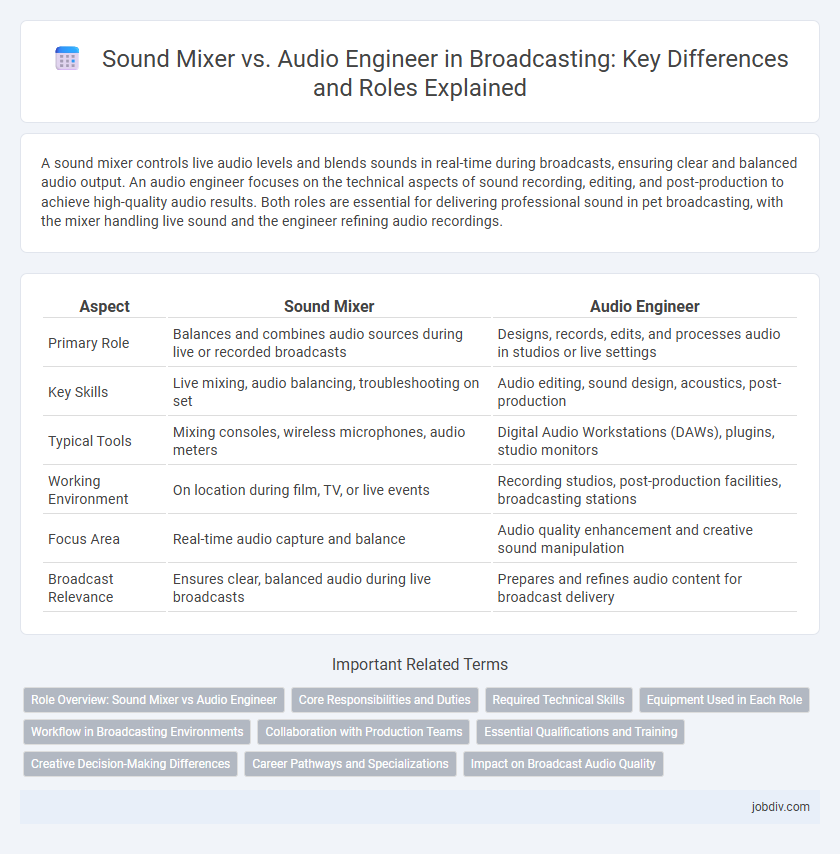A sound mixer controls live audio levels and blends sounds in real-time during broadcasts, ensuring clear and balanced audio output. An audio engineer focuses on the technical aspects of sound recording, editing, and post-production to achieve high-quality audio results. Both roles are essential for delivering professional sound in pet broadcasting, with the mixer handling live sound and the engineer refining audio recordings.
Table of Comparison
| Aspect | Sound Mixer | Audio Engineer |
|---|---|---|
| Primary Role | Balances and combines audio sources during live or recorded broadcasts | Designs, records, edits, and processes audio in studios or live settings |
| Key Skills | Live mixing, audio balancing, troubleshooting on set | Audio editing, sound design, acoustics, post-production |
| Typical Tools | Mixing consoles, wireless microphones, audio meters | Digital Audio Workstations (DAWs), plugins, studio monitors |
| Working Environment | On location during film, TV, or live events | Recording studios, post-production facilities, broadcasting stations |
| Focus Area | Real-time audio capture and balance | Audio quality enhancement and creative sound manipulation |
| Broadcast Relevance | Ensures clear, balanced audio during live broadcasts | Prepares and refines audio content for broadcast delivery |
Role Overview: Sound Mixer vs Audio Engineer
Sound mixers manage live sound levels during broadcasts, ensuring balanced audio output for immediate transmission. Audio engineers design, implement, and maintain audio systems, focusing on recording, editing, and sound quality optimization in both live and studio environments. Their roles intersect in audio management but differ in scope, with mixers emphasizing real-time sound control and engineers emphasizing technical sound production.
Core Responsibilities and Duties
Sound mixers primarily focus on capturing and balancing live audio during broadcasts or recordings, ensuring clarity and minimal background noise. Audio engineers handle the technical aspects of sound production, including editing, mixing, and mastering audio tracks to achieve the desired audio quality. Both roles require expertise in audio equipment and software, but sound mixers are more involved in real-time sound management, while audio engineers concentrate on post-production sound refinement.
Required Technical Skills
Sound mixers require proficiency in operating mixing consoles, signal flow understanding, and real-time audio balancing during live broadcasts. Audio engineers demand advanced skills in acoustics, digital audio workstations (DAWs), sound design, and post-production editing. Both roles necessitate knowledge of microphone placement, audio effects processing, and troubleshooting audio equipment for optimal broadcast sound quality.
Equipment Used in Each Role
Sound mixers primarily operate equipment such as mixing consoles, microphones, headphones, and signal processors to balance live audio during broadcasts. Audio engineers utilize advanced tools including digital audio workstations (DAWs), equalizers, compressors, and multitrack recorders to edit and enhance sound quality in post-production. Both roles depend on high-quality monitoring systems to ensure precise audio output tailored to broadcast standards.
Workflow in Broadcasting Environments
Sound mixers in broadcasting environments primarily focus on live audio levels, balancing multiple sound sources in real-time during productions. Audio engineers, however, engage in both live and post-production workflows, applying advanced techniques such as equalization, compression, and audio restoration to ensure optimal sound quality. The collaboration between sound mixers and audio engineers streamlines the broadcast workflow, enhancing overall audio clarity and listener experience.
Collaboration with Production Teams
Sound mixers collaborate closely with directors, producers, and camera operators to ensure audio levels are balanced and synced with visuals during live or recorded broadcasts. Audio engineers work with production teams to design, implement, and troubleshoot complex sound systems, enhancing overall audio quality and fidelity for both live events and post-production. Both professionals integrate technical expertise with creative input to achieve high-quality sound that aligns with the production's artistic vision.
Essential Qualifications and Training
Sound mixers typically require hands-on experience with live audio equipment and a strong understanding of mixing consoles, often gained through technical training or vocational programs. Audio engineers usually possess formal education in audio production or sound engineering, including knowledge of acoustics, recording technology, and sound design, often acquired through specialized degrees or certifications. Both roles demand proficiency in digital audio workstations (DAWs) and continuous skill development to keep pace with evolving broadcasting technologies.
Creative Decision-Making Differences
Sound mixers concentrate on balancing live audio levels during broadcasts, prioritizing real-time adjustments to achieve clear and consistent sound. Audio engineers engage deeply in post-production, creatively shaping audio textures and effects to enhance narrative impact and audience immersion. Their decision-making diverges, with mixers focused on immediate sound fidelity while engineers emphasize artistic audio design and refinement.
Career Pathways and Specializations
Sound mixers typically focus on live audio balance and technical operation during broadcasts, specializing in mixing multiple sound sources in real-time environments. Audio engineers have broader roles encompassing recording, editing, and post-production, often specializing in music production, sound design, or broadcast engineering. Career pathways for sound mixers usually lead to live event coordination or broadcast technician roles, while audio engineers may advance into studio management, acoustic consultancy, or advanced audio technology development.
Impact on Broadcast Audio Quality
A sound mixer directly influences broadcast audio quality by balancing live audio inputs, ensuring clear dialogue and consistent sound levels that enhance viewer experience. Audio engineers apply technical expertise to optimize sound recording, mixing, and post-production, addressing issues like noise reduction and dynamic range for professional-grade broadcast output. Both roles are essential in producing high-quality audio that meets broadcast standards and audience expectations.
Sound Mixer vs Audio Engineer Infographic

 jobdiv.com
jobdiv.com